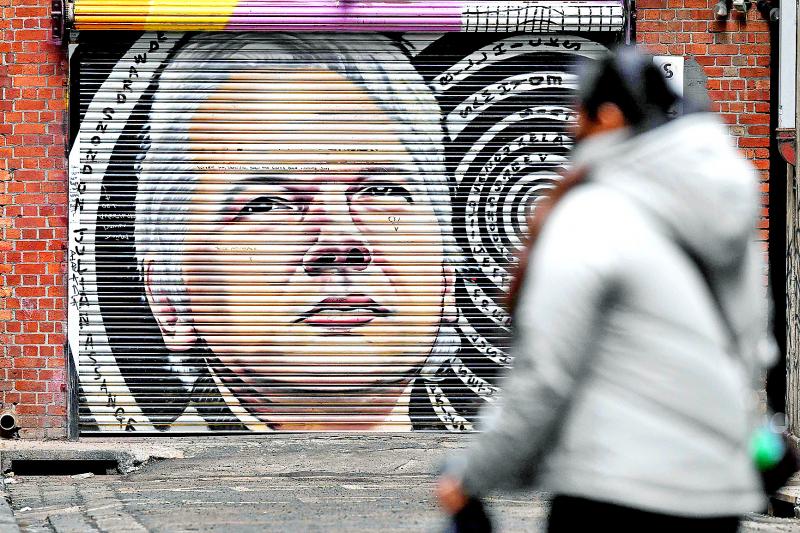Australian Prime Minister Anthony Albanese said yesterday that he would engage “diplomatically” over the US prosecution of Julian Assange, but he is standing by earlier remarks questioning the purpose of further legal action.
As domestic pressure mounted on him to intervene in the WikiLeaks frontman’s case, Albanese said he is sticking to comments he made while in opposition last year that “enough is enough.”
“I do not see what purpose is served by the ongoing pursuit of Mr Assange,” Albanese said at the time.

Photo: AFP
However, the Australian leader criticized “people who think that if you put things in capital letters on Twitter and put an exclamation mark, then that somehow makes it more important.”
Instead, he said: “I intend to lead a government that engages diplomatically and appropriately with our partners.”
Assange’s wife, Stella Assange, told ABC Radio yesterday that she had heard that the Albanese government was raising her husband’s case with US President Joe Biden’s administration.
“That is extremely welcome news,” she said, adding that she had not been able to see Assange since a British court last week cleared a path for his extradition to the US.
“When I heard the news I just wanted to give him a hug,” she said.
Assange’s long-running legal saga began in 2010 after WikiLeaks published more than 500,000 classified US documents about the wars in Iraq and Afghanistan.
He has been held on remand at a top-security jail in southeast London since 2019 for jumping bail in a previous case accusing him of sexual assault in Sweden.
That case was dropped, but he was not released on grounds that he was a flight risk in the US extradition case.
As Assange’s potential US extradition looms, several high-profile Australians, including former minister of foreign affairs Bob Carr, have called on Albanese to demand the US drop the prosecution.
“If Albanese asks, my guess is America will agree,” Carr wrote yesterday in an op-ed in the Sydney Morning Herald.
Carr said that Assange’s prosecution stood in sharp contrast to the US pardoning former military intelligence officer Chelsea Manning, who had leaked secret files to WikiLeaks.
“Our new prime minister can say: ‘We’re not fans of the guy either, Mr President, but it’s gone on long enough. We’re good allies. Let this one drop,’” he wrote.
During an election campaign last month that swept his Labor Party to power, Albanese said that Assange had “paid a big price for the publication of that information already.”
Carr was minister of foreign affairs in 2012 when Assange, who was facing sexual assault allegations, sought refuge in the Ecuadorian embassy in London.
For much of the past decade, Australia’s previous conservative government did not publicly advocate for Assange’s release.

The team behind the long-awaited Vera Rubin Observatory in Chile yesterday published their first images, revealing breathtaking views of star-forming regions as well as distant galaxies. More than two decades in the making, the giant US-funded telescope sits perched at the summit of Cerro Pachon in central Chile, where dark skies and dry air provide ideal conditions for observing the cosmos. One of the debut images is a composite of 678 exposures taken over just seven hours, capturing the Trifid Nebula and the Lagoon Nebula — both several thousand light-years from Earth — glowing in vivid pinks against orange-red backdrops. The new image

Canada and the EU on Monday signed a defense and security pact as the transatlantic partners seek to better confront Russia, with worries over Washington’s reliability under US President Donald Trump. The deal was announced after a summit in Brussels between Canadian Prime Minister Mark Carney and European Commission President Ursula von der Leyen and European Council President Antonio Costa. “While NATO remains the cornerstone of our collective defense, this partnership will allow us to strengthen our preparedness ... to invest more and to invest smarter,” Costa told a news conference. “It opens new opportunities for companies on both sides of the

ESPIONAGE: The British government’s decision on the proposed embassy hinges on the security of underground data cables, a former diplomat has said A US intervention over China’s proposed new embassy in London has thrown a potential resolution “up in the air,” campaigners have said, amid concerns over the site’s proximity to a sensitive hub of critical communication cables. The furor over a new “super-embassy” on the edge of London’s financial district was reignited last week when the White House said it was “deeply concerned” over potential Chinese access to “the sensitive communications of one of our closest allies.” The Dutch parliament has also raised concerns about Beijing’s ideal location of Royal Mint Court, on the edge of the City of London, which has so

With a monthly pension barely sufficient to buy 15 eggs or a small bag of rice, Cuba’s elderly people struggle to make ends meet in one of Latin America’s poorest and fastest-aging countries. As the communist island battles its deepest economic crisis in three decades, the state is finding it increasingly hard to care for about 2.4 million inhabitants — more than one-quarter of the population — aged 60 and older. Sixty is the age at which women — for men it is 65 — qualify for the state pension, which starts at 1,528 pesos per month. That is less than US$13